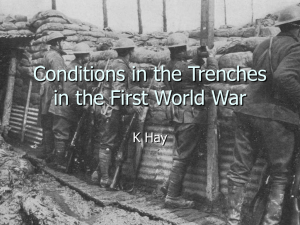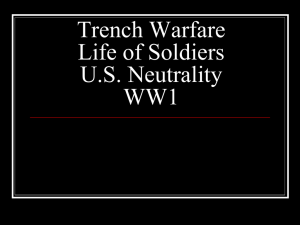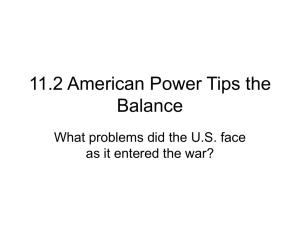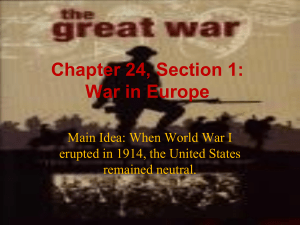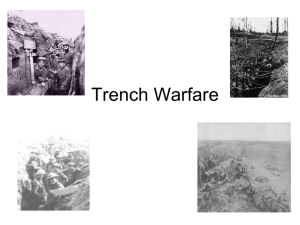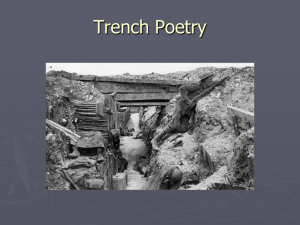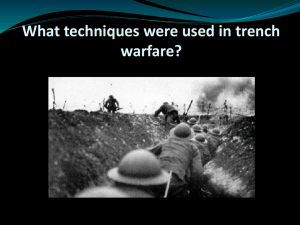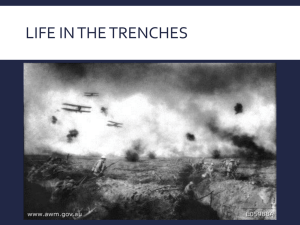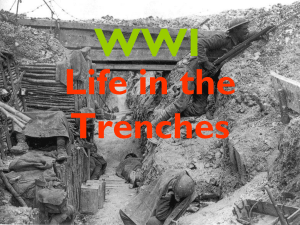Allied powers
advertisement
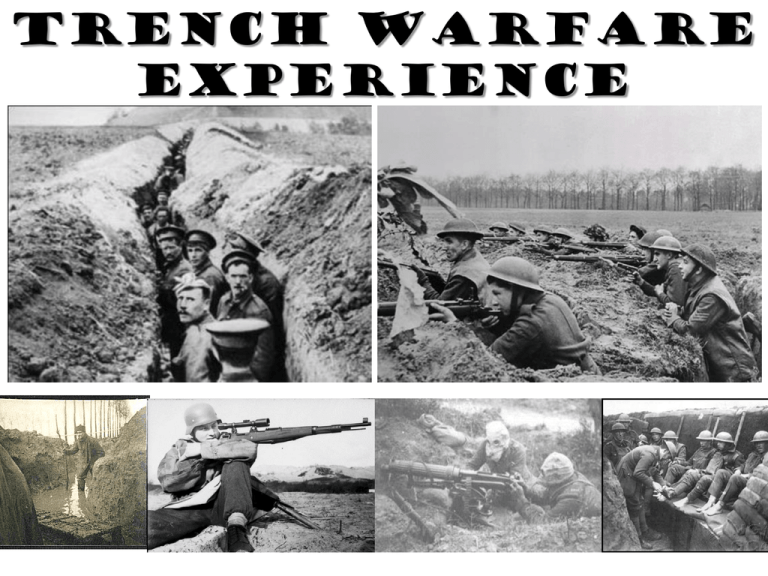
Trench Warfare Experience Allied powers are primarily England, France, and Russia. Central powers are Germany, Austria-Hungary, and the Ottoman Empire. It took you many months to dig and build the deep trenches that you are now in that are sheltering you from the enemy. You are located on the borders of France, and have been fighting your enemy in the same trenches for months. Each trench is about 7 feet deep and 6 feet wide, and the walls are made of wood. Just in front of your trench, there is barbed wire to prevent the enemy from sneaking into your camp. This area between the two trenches was called “No Man’s Land.” Take a look at the picture of a trench on the next slide… http://www.history.com/topics/world-war-i/world-war-i-history/videos/lifein-a-trench WWI Weapons • Chemical Warfare • Machine Guns – Machine guns needed 46 men to work them and had to be on a flat surface. They had the fire-power of 100 guns. – Could fire 600 rounds in a minute. • Chlorine gas causes a burning sensation in the throat and chest pains. Death is painful you suffocate! If the wind is in the wrong direction it could end up killing your own troops rather than the enemy. • Mustard gas was the most deadly weapon used. It was fired into the trenches in shells. Effects include: blistering skin, vomiting, sore eyes, internal and external bleeding. Death can take up to 5 weeks. WWI Weapons • Planes • Tanks – Tanks were used for the first time in the First World War. They were developed to cope with the conditions on the Western Front. The first tank was called 'Little Willie' and needed a crew of 3. Its maximum speed was 3mph and it could not cross trenches. – The more modern tank was not developed until just before the end of the war. It could carry 10 men, had a revolving turret and could reach 4mph. – Planes were also used for the first time. At first they were used to deliver bombs and for spying work but became fighter aircraft armed with machine guns, bombs and some times cannons. Fights between two planes in the sky became known as 'dogfights' Lets see what happens when a soldiers steps out of his trench to confront the enemy. Soldier Lindstrom steps up from the Central powers. What will a soldier from the Allied powers do in response? As soon as sniper Bennett from the allied powers sees the soldier, she eliminates the soldier with one shot! Now you are forced to live in a trench for the whole war. Each group of soldiers stays in the front line trench for 8 days, the reserve trench (which is behind the front line trench) for 4 days, and the recovery area (not a trench) for four days. Battle Scene – Trench Warfare Just watch and think what the commanders are asking these men to do! https://www.youtube.com/watch?v=N84Iq1PnE PQ Food in the Trenches As a soldier, your meals are not as tasty as you would like. You love to get meat, but as the war continues, you get less and less of it, and more and more hard, stale bread. Be sure to keep it safe because the rats love to eat your bread. A total of 3 million tons of food were shipped to the front lines from Britain along with 300,000 workers to distribute it. Troops, like you, at the front line get 6 oz of meat each day. It takes 8 days for bread to get to where you are. Unfortunately, the bread became hard and stale by the time it reached you. In order to make it decent to eat, your kitchen crew mixes it up with hot soups which included horse meat. As you might have seen in the baggage picture, soldiers had to carry around an emergency supply of food. Each soldier carries a certain amount of supplies with him. Take a look at the picture on the right and answer questions 4-5. Crimes Of course as a soldier, there are many rules that you are expected to follow. However, some rules are considered worse than others. While in war, if you committed any of these crimes, you would be executed by a firing squad: Desertion (running away), Cowardice in the face of the enemy, quitting your post, disobeying an authority, murder, striking a superior officer, casting away your arms, mutiny, or sleeping at your post. Soldier Veeder is in the process of committing the serious crime of cowardice!!! And soldier Swan is mostly likely to fall asleep at the post. Dysentery An unfortunate event has occurred. Soldier Seifert has come down with the disease dysentery! This is very common for soldiers in the trenches. A bacteria has entered Seifert large intestine. First, he has stomach pains and diarrhea, then vomiting and a fever. It must have entered his body through some unhealthy food. It is caused by unsanitary conditions in the trenches. If the diarrhea continues, this soldier will dehydrate and maybe die. Shell Shock A long gruesome battle just ended. Many people are injured badly. In this battle alone, nearly 500,000 tons of artillery were fired. Unfortunately, Soldier Page had developed shell shock. Shell shock is a disease caused by the firing of so many shells. Private Page has become tired and irritable from the shell shock. Then, Lieutenant Lipman becomes giddy, loses concentration, and has a headache. Finally, Page begins to have a mental breakdown and starts going crazy. The doctor says the only cure was the leave the battle entirely. Two percent of all British soldiers got shell shock. Answer questions 6 and 7. Bugs in the Trenches. Watch out!! Next to Corporal Goldstein is one of the biggest rats you have every seen!! They crawl around the trenches and multiply! One pair of rats can produce 880 offspring in one year! Rats spread disease and worst of all, try to eat dead soldiers. They will start by eating the eyes of the dead soldiers and work their way into the rotting bodies. This was extremely gross. You should be careful because the rats will come right up to you and eat the food out of your pockets while you are sleeping! Possibly even worse, Soldier Adams has come down with a bad case of body lice. Soldier Billow gets bit by the lice and it leaves an itchy red mark. Also, the lice create a sour smell through the trenches. There were very few ways to get rid of the lice. Adams and her friend Billow are trying to burn the lice, but it is difficult to make sure you do not burn your clothes or yourself. Lice carried a disease called trench fever, and unfortunately, Sergeant Sweeney has contracted the disease. Trench fever starts with shooting pains in the leg, and continues with a high fever. Fortunately, it is not lethal. Answer question 8. Trench foot The last three days have been awful. It has rained non-stop and the trenches are full of water up to your knees. A very sad and gross thing has happened in the trenches. Brigadier Briggs and Soldier DiCaro have trench foot. This is an infection of the feet caused by cold, wet, and unsanitary conditions. Briggs and DiCaro feet have swelled, rotted and he can no longer walk. If he does not get treated for trench foot soon, his feet will have to be amputated. Look at the picture of trench foot and answer question 9. Gas attacks. The allied forces are making a move against the central powers. Soldier Phelps just threw a chlorine bomb into the enemy trench. All people in the central powers will want gas masks. Until WWI, it was considered ungentlemanly to use gas warfare. Not any more. Chlorine gas would slowly kill a person by attacking their respiratory system. The most lethal gas was mustard gas, which burned people skin causing blisters, causes them to vomit, bleed externally and internally and eventually die. It was four to five weeks of slow and painful death. Nearly 6000 people died from gas attacks in WWI. No Man’s Land and an Offensive The area between the trenches is called no man’s land. At all times, no man’s land in being watched by many machine guns and many snipers. The Central powers have decided to send Scout Stradley as a scout to check out the allied trenches. However, Stradley has been spotted by the Allied sniper Bennett. Another perfect shot. Sometimes, when returning from a mission, soldier could get shot by their own sniper by mistake. http://www.history.com/topics/world-war-i/world-war-ihistory/videos/trenchwarfare?m=528e394da93ae&s=undefined&f=1&free=false Finally, the allied forced will try an offensive. This is an attack on the other side’s trench. Very few were successful. Attack Allied powers! (Answer question 10)

